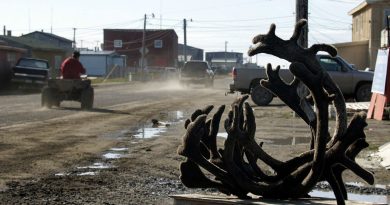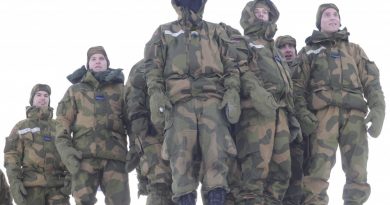Nunavut asks federal gov’t for help handling tuberculosis outbreaks

Nunavut’s chief public health officer, Dr. Sean Wachtel, says he will be requesting federal aid to help deal with the territory’s tuberculosis outbreak.
On Tuesday, the territorial government declared an outbreak in Naujaat, following earlier outbreaks in Pond Inlet and Pangnirtung.
Wachtel is asking for more public health nurses to come to the communities.
He’s also encouraging people in the community to get screened for the disease if they have been exposed to an active case or have symptoms.
In most cases, tuberculosis can be treated at home.
Wachtel spoke to CBC’s Emily Hawes about how public health is addressing the outbreak.
This interview has been edited for clarity and length.
Can you tell me the latest on the case update with Naujaat?
Currently there are six active cases in the community and 12 cases of latent, or sleeping, TB. In terms of where they are with the outbreak, it may help to clarify how we decide to declare an outbreak and why we do that.
With TB being widespread in the territory, we are used to seeing cases pop up from time to time in different locations. That’s the nature of a widespread, or endemic, disease and we monitor those cases over a period of time. If we see a level of cases above the expected case rate that existed over the last little while, we then consider that a cluster.
The main things that lead us to determine an outbreak is: number one, the number of cases exceeding the expected case rates; and number two, whether there’s any contact that can be established between cases. The reason for that is if there are cases coming up where we cannot establish contact to one of the active cases, it leads us to believe that there is a lot of sleeping TB, widespread infection, within the community. So this was the case in Naujaat. The reason we declare an outbreak is to alert the community and to focus our efforts on the community to deal with the situation there.
How are you dealing with the outbreak?
The cornerstone of dealing with a TB outbreak is to firstly identify cases of active disease and then to trace anyone who may have been infected and test them. Most people will have sleeping TB, which is not infectious and does not cause any symptoms, so the only way they can really be identified is by being tested. In order to effectively do that, we have to work closely with the community.
The history of TB in the North is a very traumatic one, understandably, given the fact that many people were taken away from their communities to the South and some of them never came back. That has generated a lot of fears and stigma around TB. When an outbreak is declared and when we have to talk to communities about this, we have to be cognizant of the context of TB in the territory. Dealing with that fear and stigma is an essential part of the process and we do that by engaging with the community, providing communications, health promotion and education material through our staff, the media, social media. We will be providing a service very, very different to the way it was provided in the past.
Very occasionally we would recommend somebody goes to hospital because they need specialized treatment depending on how sick they are. But the vast majority of cases of TB, which I would also stress is just another disease, can be treated effectively with antibiotics at home in communities.
There’s going to be community-wide testing in Pangnirtung later this year. Do you think that this might be needed in Pond Inlet or in Naujaat in the future?
It’s always a possibility. A community-wide screen is another step in outbreak management, so the steps would be: engage the community, discuss with them what’s going on, make announcements. Contact tracing and treatment is already going on by this stage. Then the next step, if we’re not seeing an improvement in this situation, would be to discuss with the community whether they would support a community-wide screen. Without the support of the community, this will not be successful.
Do you have any updates on how things are going in Pangnirtung and Pond Inlet?
In Pangnirtung, since the first of January this year, they’ve had eight cases of sleeping or latent TB. In the outbreak to date, declared in 2021, there have been 175 cases of latent TB and 38 active cases.
In Pond Inlet, there are currently 48 latent cases and eight active cases.
What are you doing to try and get them under control?
We physically visited the affected communities, the minister of health and myself, accompanied by others. We met with the council to explain the situation and we are endeavouring to ramp up contact tracing and treatment.
In order to do that, I have requested federal assistance for both Pangnirtung and Pond Inlet, and I am discussing federal assistance in the case of Naujaat and I will be requesting it.

And what do you want that federal assistance to do?
Typically our big challenge is staffing and in the case of the community-wide screening in Pangnirtung, the request is around staff and equipment assets. Some specialized equipment will need to be brought in and the whole logistics of the operation, because a community-wide screen is a very big undertaking.
In the case of Pond Inlet, the request was for public health nurses and we’ve had a good response to that. That request went through the Public Health Agency of Canada. For Naujaat, I’ve been discussing with Indigenous Services Canada about the provision of public health nurses through their surge capacity.
Is there a specific ask for how many nurses or is it just saying, you know, we need some nurses? How many can you provide?
Well, we have a number we would like to see, but we also have to be realistic in the context of a worldwide shortage of healthcare staff. In the case of something like a community-wide screen in Pangnirtung, we can be quite specific. I won’t go into the details of exactly what we’ve requested, but there is a specific number of staff that we’ve requested.
In other cases, we leave it open-ended because people come for a few weeks and then they go again. We might give an ideal staffing level but it’s open-ended because the response to the request waxes and wanes depending on whether people are available and willing to come to the territory.
Are we looking at most people being like 75 per cent of cases are treatable at home, or is it more like 95 per cent?
This depends on several factors; the most important one being how sick somebody is. Sometimes they need medical input that’s just not available in health centres and they need to be in hospital. So it very much depends on how they present and at what stage of the sickness they present.
That is one reason why we encourage people to get screened, because the earlier the infection is identified, the quicker people can be treated and the less likely they are to need to be in hospital. Particularly in the case of sleeping TB, where patients don’t have any symptoms, they won’t know that they have this infection in the body unless they get tested. At that stage, the treatment is very straightforward and very effective and so they won’t need to leave the community. But 50 per cent of cases of sleeping TB become active within two years. If somebody doesn’t get screened and the infection just sits there in their body and then becomes active and then they become sick, the chances of having a recommendation that hospital treatment will be in their best interest become much higher.
Related stories from around the North:
Canada: Naujaat becomes 3rd Nunavut community to face tuberculosis outbreak, CBC News



